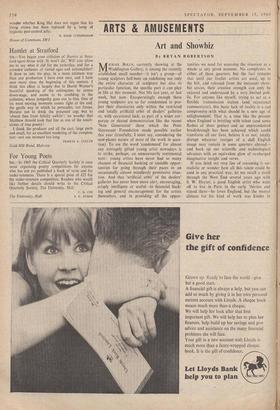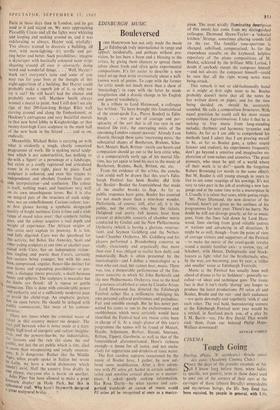EDINBURGH MUSIC
' Bouleversed
Selves about fresh and often quite experimental compositions. It's far easier to describe a new tonal set-up than write re-creatively about a well- known work of genius. To cope with the former the critic needs not much more than a show of `musicology': to cope with the latter he needs imagination and a drastic change in his English and general vocabulary.
In a tribute to Lord Harewood, a colleague has written: `To have brought this fountainhead of the avant-garde [i.e., Pierre Boulez] to Edin- burgh . . . was an act of courage and per- spicacity of the sort that is-all too rare in our musical life (viz., the enervating mists of the oncoming London concert season).' Already I can discern, through these same 'enervating mists,' the substantial shapes of Beethoven, Brahms, Schu- bert, Mozart, Bach. Britten--surely our hearts and compassion should go out to the lorn critic who, at a comparatively early age of his mortal life- time, has yet again to lend his ears to the music of Beethoven, Brahms, Bach, Britten, etc. etc.
Boulez, achieved by the brilliant Mlle Loriod, I doubt if anybody except the composer himself —and not always the composer himself—could be sure that all the right wrong notes were beingsstruck.
This remark is not so old-fashionedly banal as it might at first sight seem to be. Boulez probably doesn't insist that all the notes he
has written down on paper, and for the time being decided on. should be accurately sounded. He calls a composition Structures. With
equal precision he could call his most recent
compositions Approximations. I take it that he is seeking to free music from long-standing
melodic, rhythmic and harmonic tyrannies and habits. As far as I am able to comprehend his methods (and I admit that I am proving myself to be, as far as Boulez goes, a rather stupid listener and student), his experiments frequently don't go beyond a sensitive and imaginative ex- ploration of tone-values and acoustics. The great pioneers, who must be quit of a world where all their work is to do!'—quoth the forgotten Robert Browning (or words to the same effect).
But M. Boulez is still young enough in years to live to see some reapings of his sowings. It's not easy to take part in the job of evolving a new lan- guage and at the same time write a masterpiece in it.Usually it is talent that sows, while genius,reaps. Mr. Peter Diamand, the new director of the Festival, hasn't yet given us the outlines of his
intense and capitalised; as if somehow the more raffish you were, the (as it were) livelier you must be in a quite literal sense, and the further you lived from this deliciously sinful hub of things the less relevant to Life your doings in- evitably were. Today, with the fences down between professional and amateur, indeed with amateurs surely swamping the professional market, the strictly identifiable, classifiable tart is hard to label. But the porde de luxe, of a sort, is still around. John Schlesinger's Darling is about one, contemporary-style. She starts as a model for bras, progresses to television commercials, and ends up as an Italian princess, and no one has quite decided whether it is all a dank cautionary tale or a sizzling slice of our old friend Life after all.
The trouble, or one of the troubles, is. that, except in personality (being played by Julie Christie, her personality fairly hums along like a small hot dynamo), this particular darling is vapid beyond the point where one cares two pins about her. The film narrative is hung on, the life-story she tells to a women's magazine, with, of course, a satirical contrast all through between the cosy whitewash she gives her readers and the unpretty reality. Yet the feeling is that, although no one connected with the film believes in the whitewashing facts (for `miscarriage' read 'abortion,' etc.), we are some- how being nudged into goggling and gasping almost as much as the magazine's owlish readers, whose eyes pop at the 'thought of titles, footmen and the admen's notions of luxury; whereas we, sophisticated souls who know all about pickups in Capri and recherche Parisian nightlife, merely need heftier nudges and more piquant pokes. And when a satirist starts being taken in by his own material, goodbye to the effects of his satire.
Another trouble is that, as happens so often in films, the moment it goes outside the hermetic world of showbiz (and its attendant satellites, modelling, photography, fashion, publicity), its observation goes soggy. Diana (the Darling) is supposed to come from an upper-middle-class family, but when she visits them one's heart sinks. With lecherous tycoons and Chelsea birds, with all exuberant extroverts, the film may be dead on target; but with any plain bourgeois characters at home, perhaps because the plain bourgeois just isn't histrionic enough as a rule to be played by actors, it is wildly out. Frederick Raphael's script, with desperate ineptitute, starts feebly exaggerating, and in detail, as well as in spirit, grows inaccurate (the small nephew would no more call his young aunt Auntie Diana than her grown-up stepchildren would address her as Mamma). The fact that the world
Dirk Bogarde and Julie Christie































 Previous page
Previous page